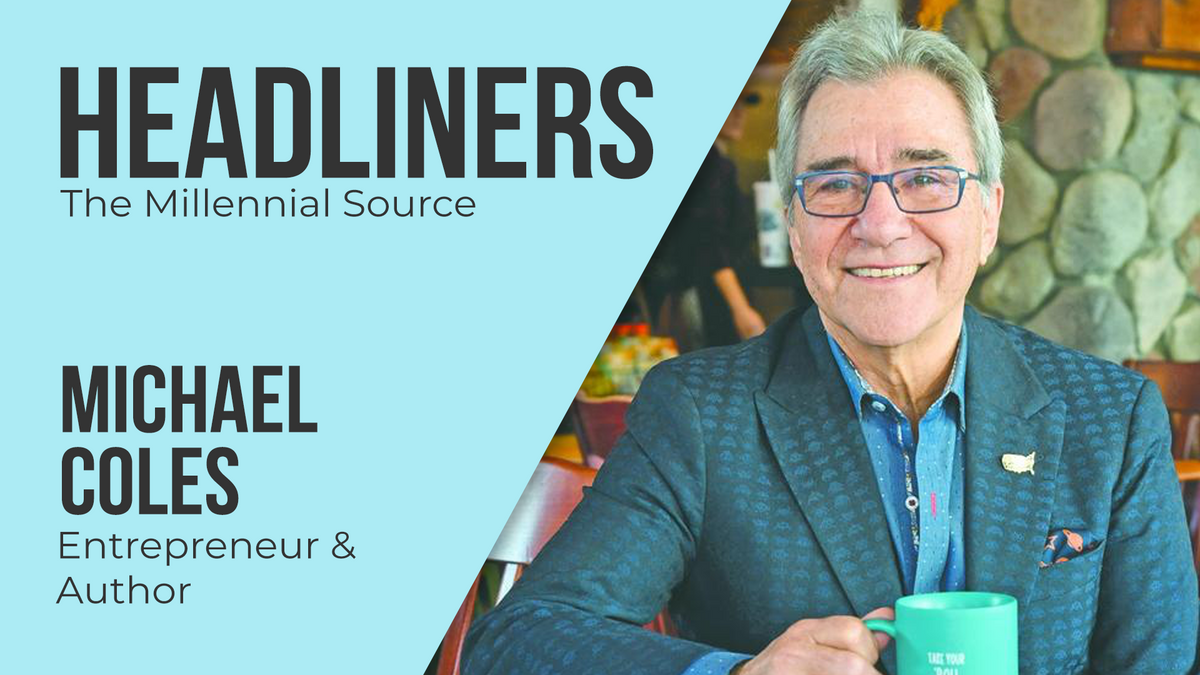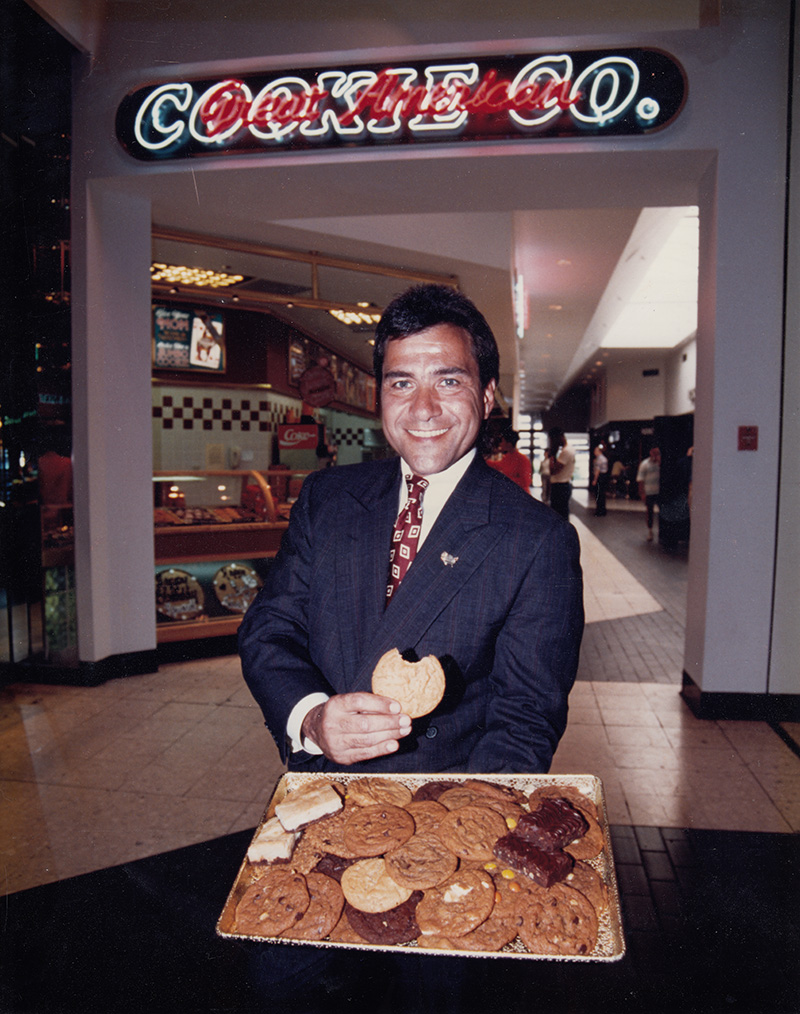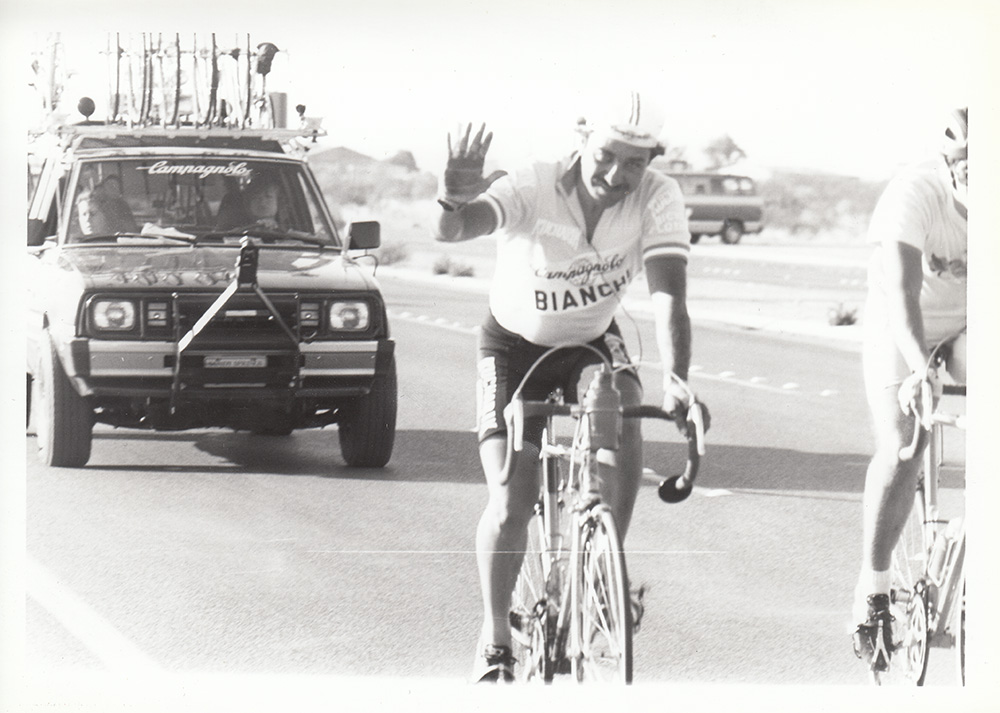“Glory does not reside in the outcome,” says Great American Cookie Company co-founder and author Michael J. Coles

A few minutes every morning is all you need.
Stay up to date on the world's Headlines and Human Stories. It's fun, it's factual, it's fluff-free.

Michael J. Coles is co-founder of Great American Cookie Company and the former chief executive officer of Caribou Coffee, but these titles are just the tip of the iceberg of his professional background. Coles is also a well-known speaker, business mentor and educator and serial entrepreneur. He has tasted great success in his lifetime, quite literally. Although, it hasn’t been without his own experiences as an underdog and facing many challenges as well.
Coles reflected in a 2019 speech at TiECON Florida on one of the hardest moments in his life. At age 10, he had to give away his dog, Lucky, after his father’s warehouse caught fire and his family had fallen into poverty.
So, at age 13, Coles began working due to his family’s financial troubles. His early work experience led him to find a mentor in his employer, Irving Settler, who Coles said “taught me everything about retail.”
“I would not have been successful had he not been so hard on me or invested so much time in my education,” he explained. “As I have moved throughout my career, I have tried to pay back that debt by giving time and energy to young entrepreneurs, helping them avoid the same mistakes I made.”
One way Coles has paid it forward is by being the benefactor of the Coles College of Business at Kennesaw State University.
We were happy to chat with Coles to learn the fascinating story of his life’s journey so far, as he has pulled off remarkable business and athletic feats.
Another fire, another emergence

Coles worked for more than 19 years in the clothing business. His desire for work that would allow him to stay home more with his family sparked a non-cookie-cutter interest in opening a cookie store.
Coles and his partner, Arthur Karp, initially put only a US$4,000 investment into the Great American Cookie Company in 1977. Yet, their business (which grew into a national chain) went on to generate sales of more than US$100 million before they sold it to Mrs. Fields Famous Brands in 1998. That fact alone might have you believe that from the start the business was a piece of cake – or rather, cookie.
However, as Coles explains in his book, “Time to Get Tough: How Cookies, Coffee and a Crash Led to Success in Business and Life,” the journey was not all smooth sailing.
For instance, on their first day of business, they forgot the oven mitts and had no way to remove the cookies from the oven. This situation ended up involving the fire department and panic from mall-goers.
“While starting a company might seem exciting and glamorous, entrepreneurship means a lot of hard work, late nights and sacrifice,” Coles said. “Whether you are building a cookie store or a technology startup, you will have to tackle monumental challenges and find yourself working harder than you ever thought possible.”
We were born to soar, not to accept defeat

Just six weeks after Coles opened his first Great American Cookie store, he had a near-fatal accident on his Harley-Davidson that almost cost him everything. Only 10 minutes from home, he felt his rear wheel lock up and he was thrown from the bike into a telephone pole.
“The next thing I knew, doctors were standing over me telling me I was alive, but I would probably never walk unassisted again,” he remembered. “This was a lot to absorb, but when I came to understand how bad the accident was and the real possibility that I might not have woken up at all, I tried to put everything in perspective.”
Instead of letting the accident defeat him, it instead sparked a new determination within Coles.
“The only thing I was sure about was that my future and the business were both in doubt,” he said.
Facing a painful and prolonged period of rehabilitation, Coles decided he had to focus on his cookie business, when originally he had thought of it as a shorter term venture. Nine months into his rehab, Coles had a moment with his three-year-old daughter, Taryn, that he says changed his life forever.
“We were walking up our steep driveway to get the mail when she challenged me to race her to the mailbox,” he recalled. “I was on two canes at the time, but figured even on two canes I could beat her to the mailbox. When I took off to run the pain was excruciating and I realized I couldn’t do it.”
“It was the first time since my accident that I realized I was disabled,” he explained. “But not so much disabled in my legs; disabled in my mind. It was the first time in my life that someone told me what my limits were, and I believed them.”
“You see, I grew up poor and throughout my life people always told me how far I could go, and it always gave me an incentive to prove them wrong,” he said. “But this time I was living in the safety zone that doctors had given me, because I can tell you today that learning how to walk again at 33 really hurts.”
“So I began a self-styled rehabilitation program that eventually took me from a stationary bicycle to a regular bike, and at the same time we took The Cookie Company to its national success. I not only learned to walk again, but set three world records riding coast to coast on my bicycle.”
His transcontinental bicycle race from Savannah, Georgia, to San Diego, California was even made into a documentary which allows us to appreciate the challenge of his undertaking.
What we can learn from Coles
Coles has had his share of hits and misses. In 2003, he took leadership at Caribou Coffee Company and doubled the size of the company. In the mid-90s, he ran for both the US Congress and US Senate, but did not get elected. Despite his epic-seeming life, his simple yet powerful message on setbacks could be relevant for us all.
“Regardless of how well you prepare, you will be confronted with uncertainty, failure and plenty of surprises,” Coles said. “In the final analysis, though, failure is not about the falling, but about the staying down. The ability to get back up, over and over again, will set you apart from those who doubt your abilities or tell you that your ideas are unsound.”
We were excited to speak in more detail with Coles to learn about his inspiring life and adventures.
What pushed you to create the Great American Cookie Company? How did you go from idea to action?
The idea to start a cookie business came from a most unlikely place. While visiting San Diego for a clothing show, I went to the local mall where I saw a cookie store packed with customers in the middle of the day. I waited in line to buy two dozen cookies and asked the manager as many questions I could about the profitability of the cookie business. I knew nothing about the food industry, but I knew a good business when I saw one.
I was fascinated by what I had learned, though still very skeptical. So, I left the mall with my big bag of cookies and went next door to the grocery store to do some research. I bought ingredients to make my mother’s chocolate chip cookie recipe, then I went to the drugstore and bought a postage scale.
I got back to my hotel suite and began to mix up a batch in the small kitchenette. I weighed each ingredient to see if the food costs were even close to what the manager of the cookie store had claimed they were, and I was dumbfounded. I could make a cookie for six cents and sell it for thirty.
After my California trip, I decided to leave the clothing business and open a cookie store in Atlanta. My partner, Arthur Karp, and I had absolutely no experience selling food and only $8,000 to invest in this new enterprise. We were undercapitalized and faced several national competitors selling the same product. Interest rates were high, inflation was soaring, and new businesses were closing in 1977 almost as fast as they could open their doors. We had every reason not to do this, but we did.
What’s something, personal or professional, you’re currently working on achieving?
After over 60 years of working, I am focusing on mentorship and sharing my experience and wisdom with those around me. Whether that takes shape on a company or nonprofit board, mentoring university students or speaking at events and schools across the country, I seek to spread the knowledge I’ve gleaned from my life in business.
What does “successful" mean to you? How does someone know when they’ve made it?
I have avoided the word “success” my entire life. It suggests that your journey is over and distracts you from growing and creating opportunities for the people around you.
But by most conventional measures, I am successful. Peeling away that superficial veneer of accomplishment, though, reveals a pile of missed opportunities, false starts and painful defeats. Ironically, some of those times have been the most satisfying, memorable, and victorious moments of my life, even though by most standards I failed. I have learned that glory does not reside in the outcome; success presents itself in the journey.
Can you recall a specific moment in which you felt truly successful – that you had accomplished a major goal?
When we launched our second Great American Cookie Company store in Greenbriar Mall, we expected it to be as successful as our first store in Perimeter Mall. We were in a bigger space with more foot traffic right next to the famous Chick-fil-A – what could be better? We continued with our classic strategy – cookie samples, glass displays – but our sales were much lower than at Perimeter Mall. If we couldn’t turn the Greenbriar store around, we would be out of business.
I learned that I couldn’t lean on my entrepreneurial skills exclusively. I had to consider the community we were serving. Efficiency became top priority. We focused on investing in quality training and customer service in order to streamline our operations. We brought on an employee that was a talented artist that grew our cookie cake sales to over 40%. In seventy days, we turned the store around.
The crisis at Greenbriar was the key ingredient to our success. We were able to deliver a great product and incredible customer service, all with a better-trained staff that could function in a lean and efficient manner. The knowledge we gleaned from Greenbriar Mall put Great American Cookies into the trajectory that launched it into success.
You also ran for political office. What drove you into this field? Would you do it again today?
After campaigning for my friend, Governor Zell Miller, I saw how much public service could do to change people’s lives. I also saw that not every Georgia politician was as effective.
I remained engaged in politics after the campaign and went on to assist in recruiting someone to run for Congress in 1996 against Newt Gingrich. Gingrich was a contentious figure, infamous for teaching a controversial class “Renewing American Civilization” at Kennesaw State University that embroiled the KSU board where I was a member.
We needed someone to run who lived in the district, someone who cared about improving our community and its institutions, and someone who was not a career politician. Each time I described what I was looking for, the person I was trying to persuade would say to me, “You should do it.” I had never even considered running for public office; I was a businessman and had my hands full growing the cookie company.
Finally, my wife Donna convinced me, and I got to work. I asked myself, “Why do you want to run for Congress?” I dove into researching bills, budgets and current issues until I found the answer: I wanted to run for Congress because I wanted someone to represent the issues that are important to our community, who does not care about being reelected – I want to be a congressman who simply does the right thing.
When it came to Election Day, I made a strong showing, but in the end, he won. Yet, even in defeat, I felt that I brought many important issues into the local and national conversation. This is what drove me to run for Senate in 1998, and it’s what drives my support for other candidates now.
If knowing the sacrifices that were made, both physically and financially, and the impact on my family, I would absolutely run again, knowing the outcome. In how many countries would a poor kid from Miami be able to run for the United States Senate?
But I wouldn’t run today – I’ve learned as a private citizen, you can in fact make a difference in your local communities without being a part of the government.
What advice would you give your younger self?
I have ten tips that I share with young people looking for advice in business and in life:
- Take risks early in your career
- Associate only with people of integrity
- Find a mentor to guide your career. When you make your mark, become one.
- Know what you don’t know and surround yourself with people from whom you can learn.
- Even in a digital age, customers respond to, respect, and remember the personal touch.
- Have a clear mission and vision statement, and make sure your team is fully committed to it.
- How you respond to the unexpected is the difference between success and failure.
- Trust your employees and give them the opportunity to do their best work for you.
- Use the skills that helped you build a great career or business to build a better world.
- Never let someone else tell you what you cannot achieve or put limits on your potential.
Have a tip or story? Get in touch with our reporters at tips@themilsource.com




Comments ()